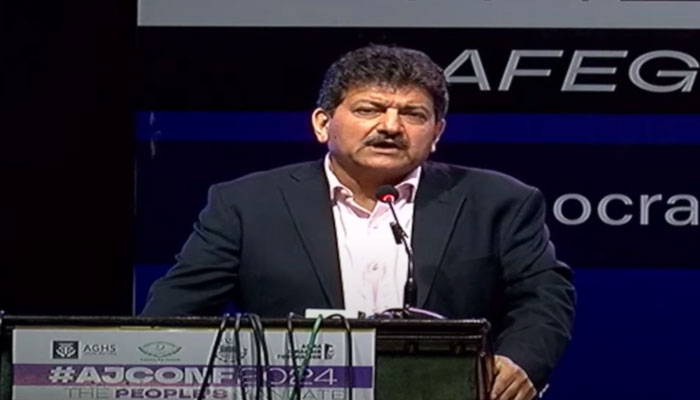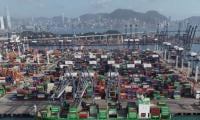Journalists urged to reclaim ‘independence’
LAHORE : During the Fifth Asma Jahangir Conference here Saturday, insightful discussions unfolded in sessions focused on parliamentary democracy and media freedom, shedding light on critical issues facing Pakistan and the broader region.
In the session titled “Reviving parliamentary democracy: Learning from the past and shaping the future,” moderated by Zahid Hussain, representatives from various political parties shared their perspectives.
PTI Senator Ali Zafar emphasised the importance of true democracy within the parliamentary system, highlighting the need for effective representation and the power of the people to drive change.
PPP parliamentarian Nafisa Shah underscored the significance of the 1973 Constitution as Pakistan’s moral compass, emphasising the validity of parliamentary democracy post the 18th amendment.
Khurram Dastagir stressed the role of parliament as a platform for comprehensive representation and harmonious discourse.
Contrasting views emerged in the session on “Silencing the media,” moderated by Matiullah Jan. Journalist Hamid Mir raised concerns about the pervasive culture of rent-seeking in Pakistan, calling for journalists to reclaim their independence.
British journalist Owen Bennett Jones advocated for the development of a fair and collaborative legal framework for media freedom, cautioning against blind emulation of restrictive laws from the West.
Journalist Arifa Noor lamented the commercialisation of media and highlighted the need to amplify the voices of ordinary people.
Indian journalist Sidharth Varadaranjan drew parallels between media challenges in India and Pakistan, pointing out the prevalence of self-censorship and state clampdowns on dissent.
These discussions underscore the complexities and challenges inherent in fostering democratic governance and media freedom in Pakistan and the broader South Asian region. As participants exchanged ideas and perspectives, the conference provided a platform for critical reflection and dialogue on issues vital to upholding civil rights and democratic principles.
South Asia’s Election Year: Experts Discuss Challenges and Concerns: In the conference moderated by renowned journalist Samina Ahmed, South Asia’s upcoming election year took centre stage, with experts shedding light on various challenges and observations across the region.
Attended by a panel of distinguished personalities including Michael Kugelman, Ahmed Bilal Mahmood, Mahbouba Seraj, Roshmi Goswami, Iftekhar Zaman, and Paikiasothy Saravanamuttu, the discussions delved into the complexities surrounding electoral processes and governance.
Ahmed Bilal Mahmood highlighted Pakistan’s struggle with voter turnout, emphasising the lack of trust in the electoral process. “Pakistan ranks second in terms of the lowest voter turnout,” Mahmood stated, attributing this trend to widespread scepticism and acknowledging the admitted interference in electoral affairs.
Saravanamuttu expressed concerns over Sri Lanka’s governance crisis, noting that no institution is functioning as it should, indicating a broader systemic challenge within the country.
Roshmi Goswami voiced regret over the strained relationship between India and Pakistan, which hindered her ability to attend the event in person. However, she underscored the critical importance of upholding human rights and democracy, particularly in light of global developments such as those in Gaza. Michael Kugelman emphasised the significance of elections as a measure of success, highlighting Afghanistan’s dire situation where elections have been nonexistent under Taliban rule, rating it at zero on the scale of electoral success.
The conference calls for urgent action on climate change and criminal justice reform in South Asia: In a recent gathering moderated by Rafay Alam, experts convened to address critical issues facing South Asia, focusing on climate change and criminal justice reform.
Addressing loss, damage, and Climate Reparations: During the session on climate change, Naz Baloch highlighted Pakistan’s vulnerability despite its minimal contribution to global carbon emissions. Baloch emphasised the need for immediate action to mitigate the impacts of climate change, stressing the urgency of the situation.
Baba Jan underscored the consequences of unchecked development in disaster-prone areas, advocating for stricter regulations to prevent future risks. Participants discussed the importance of implementing sustainable practices and policies to address climate-related challenges effectively.
Criminal justice reform and prolonged imprisonment: Moderated by Maliha Zia, the conference delved into the issue of prolonged imprisonment and its implications for human rights. Dr Qadeer Alam shed light on the concerning situation in Punjab, where thousands of death row prisoners endure extended confinement, calling for proactive judicial intervention and alternative sentencing approaches.
Zaved Mahmood drew attention to the increasing incarceration of women globally, advocating for comprehensive reforms to ensure fair treatment within the criminal justice system. Participants exchanged ideas on improving rehabilitation programmes and enhancing access to justice for marginalised communities.
The conference served as a platform for robust discussions and collaborative efforts to address pressing challenges in South Asia. Experts emphasised the importance of collective action and innovative solutions to tackle issues such as climate change and criminal justice reform effectively.
Empowering women: exploring constitutional rights from a female perspective: Under the guidance of Dr Sadaf Aziz, Dean of Law School at LUMS, a panel of distinguished speakers convened to discuss reclaiming space and interpreting the constitution from a women’s perspective.
Speakers including Mahnaz Ahbar Aziz, Riffat Inaam Butt, Ans Mashood, and Osama Malik engaged in a thought-provoking dialogue. Nafisa Shah, an esteemed member of the panel, emphasised the importance of gender-neutral language within the law, advocating for inclusivity and equality.
Gaza crisis: violations of international law: In a session moderated by Saroop Ijaz, experts addressed the ongoing tragedy in Gaza, condemning it as a breach of international law.
Francesca Albanese, speaking virtually, expressed her anguish over the situation, describing it as a genocide. Shawan Jabarin stressed the need for global support for humanity and human rights, transcending political divides. Rev Munther Isaac highlighted Israel’s disregard for the core issues at hand, urging the international community to take a stand against injustice.
Kashmir: Scrapping of Article 370: Moderated by Nasim Zehra, the panel delved into the implications of the revocation of Article 370 in Kashmir.
Victoria Schofield emphasised the need to view Kashmir as a unified region rather than fragmented, shedding light on the lack of accountability for disappearances and the plight of Kashmiri women widowed by conflict. Tariq Naqash echoed concerns about the ongoing struggles of Kashmiri people and the failure to address their grievances adequately.
The conference also featured sessions on eroding the rule of law and conflicting judicial decisions, providing a comprehensive platform for critical discussions on pressing issues facing the region.
-
 ‘Miracle On Ice’ Redux? US Men Chase First Olympic Hockey Gold In 46 Years Against Canada
‘Miracle On Ice’ Redux? US Men Chase First Olympic Hockey Gold In 46 Years Against Canada -
 Friedrich Merz Heads To China For High Stakes Talks In An Effort To Reset Strained Trade Relations
Friedrich Merz Heads To China For High Stakes Talks In An Effort To Reset Strained Trade Relations -
 Astronauts Face Life Threatening Risk On Boeing Starliner, NASA Says
Astronauts Face Life Threatening Risk On Boeing Starliner, NASA Says -
 Hailey Bieber Reveals How Having Ovarian Cysts Is 'never Fun'
Hailey Bieber Reveals How Having Ovarian Cysts Is 'never Fun' -
 Kayla Nicole Looks Back On Travis Kelce Split, Calls It ‘right Person, Wrong Time’
Kayla Nicole Looks Back On Travis Kelce Split, Calls It ‘right Person, Wrong Time’ -
 Prince William And Kate Middleton Extend Support Message After Curling Team Reaches Olympic Gold Final
Prince William And Kate Middleton Extend Support Message After Curling Team Reaches Olympic Gold Final -
 Nvidia CEO Praises Elon Musk, Calls Him An ‘extraordinary Engineer'
Nvidia CEO Praises Elon Musk, Calls Him An ‘extraordinary Engineer' -
 Shia LaBeouf's Mugshot Released After Mardi Gras Arrest On Battery Allegations In New Orleans
Shia LaBeouf's Mugshot Released After Mardi Gras Arrest On Battery Allegations In New Orleans -
 Timothee Chalamet Felt '17 Again' After Reunion With 'Interstellar' Director Christopher Nolan
Timothee Chalamet Felt '17 Again' After Reunion With 'Interstellar' Director Christopher Nolan -
 Conan O'Brien Speaks First Time After Rob Reiner's Killing
Conan O'Brien Speaks First Time After Rob Reiner's Killing -
 Giant Tortoise Reintroduced To Island After Almost 200 Years
Giant Tortoise Reintroduced To Island After Almost 200 Years -
 Eric Dane Drops Raw Confession For Rebecca Gayheart In Final Interview
Eric Dane Drops Raw Confession For Rebecca Gayheart In Final Interview -
 Trump Announces New 10% Global Tariff After Supreme Court Setback
Trump Announces New 10% Global Tariff After Supreme Court Setback -
 Influencer Dies Days After Plastic Surgery: Are Cosmetic Procedures Really Safe?
Influencer Dies Days After Plastic Surgery: Are Cosmetic Procedures Really Safe? -
 Eric Dane Confesses Heartbreaking Regret About Daughters' Weddings Before Death
Eric Dane Confesses Heartbreaking Regret About Daughters' Weddings Before Death -
 Nicole 'Snooki' Polizzi Reveals Stage 1 Cervical Cancer Diagnosis
Nicole 'Snooki' Polizzi Reveals Stage 1 Cervical Cancer Diagnosis




